 Petzlover
Petzlover Alangu Mastiff is originated from Pakistan but Bulgarian Shepherd is originated from Bulgaria. Alangu Mastiff may grow 11 cm / 5 inches higher than Bulgarian Shepherd. Alangu Mastiff may weigh 33 kg / 73 pounds more than Bulgarian Shepherd. Alangu Mastiff may live 47 years less than Bulgarian Shepherd. Both Alangu Mastiff and Bulgarian Shepherd has almost same litter size. Alangu Mastiff requires Low Maintenance. But Bulgarian Shepherd requires Moderate Maintenance
Alangu Mastiff is originated from Pakistan but Bulgarian Shepherd is originated from Bulgaria. Alangu Mastiff may grow 11 cm / 5 inches higher than Bulgarian Shepherd. Alangu Mastiff may weigh 33 kg / 73 pounds more than Bulgarian Shepherd. Alangu Mastiff may live 47 years less than Bulgarian Shepherd. Both Alangu Mastiff and Bulgarian Shepherd has almost same litter size. Alangu Mastiff requires Low Maintenance. But Bulgarian Shepherd requires Moderate Maintenance
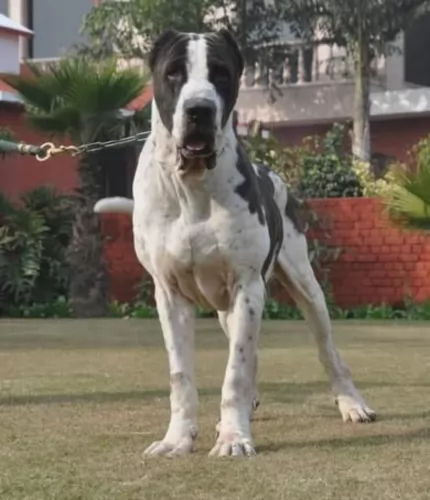 Alangu Mastiff is a breed that ,originates from southern India. Since the very beginning of this breed, it has been used as guard dogs and official dogs of Persian Army. They have been used mostly for wars and as a guard dogs for protection. Also, Alangu Mastiff was used as large gain hunters because of its size and power.
Alangu Mastiff is a breed that ,originates from southern India. Since the very beginning of this breed, it has been used as guard dogs and official dogs of Persian Army. They have been used mostly for wars and as a guard dogs for protection. Also, Alangu Mastiff was used as large gain hunters because of its size and power.
 The Bulgarian Shepard Dog comes from the ancient line of Molossers of Central Asia and Tibet, and the shepherds of the Balkans, Turkey and Caucasus. Among the oldest and most valued of the working dogs of Europe, the Bulgarian Shepherd breed was created by mixing the Balkan breeds with the dogs from Central Asia by the proto-Bulgarians around the 7th century. The Karakachanskoto Kuche was introduced to Bulgaria and accepted by the sheep herders. Mixing this breed in with the Balkan and Central Asian mix developed the Bulgarian Shepherd we know today. In the long run the original Karakachanskoto Kuche became extinct, replaced entirely by the Bulgarian Shepherd even in places where the new breed is still called by the Kuche name. Although the breeds are not the same, most of the dog world does not know the difference.
The Bulgarian Shepard Dog comes from the ancient line of Molossers of Central Asia and Tibet, and the shepherds of the Balkans, Turkey and Caucasus. Among the oldest and most valued of the working dogs of Europe, the Bulgarian Shepherd breed was created by mixing the Balkan breeds with the dogs from Central Asia by the proto-Bulgarians around the 7th century. The Karakachanskoto Kuche was introduced to Bulgaria and accepted by the sheep herders. Mixing this breed in with the Balkan and Central Asian mix developed the Bulgarian Shepherd we know today. In the long run the original Karakachanskoto Kuche became extinct, replaced entirely by the Bulgarian Shepherd even in places where the new breed is still called by the Kuche name. Although the breeds are not the same, most of the dog world does not know the difference.
In Bulgaria however the Karakachan is a national treasure and the history of the breed runs deep. One Kuche could run up to 1200 animals and hundreds were used by the herdsmen in the mountains of Bulgaria. There were many regional types of Bulgarian Shepherds with very little difference between those types. These dogs were so prized by the shepherds that the dogs ate first before the people. The dogs however ate a vegetarian diet of milk, wheat, water and oats. The Bulgarian Shepherd lives a long life of often over 20 years. The Bulgarian Army made good use of these dogs early in the 20th century.
Following World War II, the wolves were close to extinction and property in Bulgaria was nationalized. There was no longer a need for a large force of working dogs. The Communist government exterminated large numbers of sheep dogs including the Bulgarian Shepherd. Only those species on government owned farms and in remote regions survived. When the government farms were disbanded in the early 20th century, these dogs were exterminated as well. Only those in the mountains survived. Commercial breeding of the Bulgarian Shepherd in the end of the century has resulted in controversy as other breeds came into the breeding program.
Use of breeds such as Sarplaninacs, Caucasian Ovcharkas, St. Bernards, Central Asian Ovcharkas and Bosnian Tornjaks in these programs resulted in Bulgarian Shepherd or Karakachans that were a lot different from the original breed. There is therefore some concern about the future of the breed in Bulgaria, yet they received official Bulgarian national recognition in 2000. Today’s Bulgarian Shepherd is a guard dog for both property and livestock.
The official standard for the breed came about in 1991 and in 2005 it was recognized by the Bulgarian State Commission for Animal Breeds. Only those dogs that meet this standard are considered “true” Karakachans. The Bulgarian Shepherds are willing to fight bears and wolves in defense of its family and flock. The dog is brave and loyal, dignified and powerful. They are recognized by both the Dog Registry of America, Inc. (DRA) and the Bulgarian Republican Federation of Cynology (BRFC) a member of the FCI.
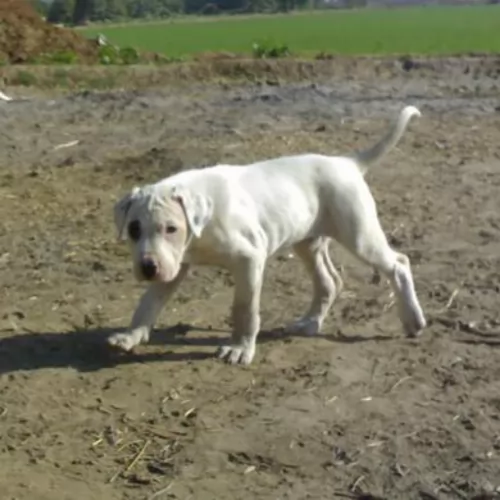 Weight of Alangu Mastiff depends but approximately, male weight is 70-90kg, while females are 60-70kg. While males height is 76-86cm. Females are slightly smaller with an average height of 75-80cm.
Weight of Alangu Mastiff depends but approximately, male weight is 70-90kg, while females are 60-70kg. While males height is 76-86cm. Females are slightly smaller with an average height of 75-80cm.
Lifespan depends drastically on every breed, but it is approximately 8-10 years.
The average litter size of Alangu Mastiff is 6-8 puppies.
Another Name for Alangu Mastiff is Sindh Mastiff.
 A massive, powerful and muscular Molosser, the Bulgarian Shepherd is strong, agile, powerful and fast. They are intelligent and reliable. They have a long, thick, harsh coat in white with patches of black. Their skull is massive and broad with a furrowed forehead. The muzzle is massive as well while the nose has wide nostrils and is fairly large. It has close fitting, thick lips with strong, scissor bite jaws. The Bulgarian Shepherd’s eyes are deep, oblique and small. They are either hazel or dark. They have an intelligent and confident, yet firm almost grim expression.
A massive, powerful and muscular Molosser, the Bulgarian Shepherd is strong, agile, powerful and fast. They are intelligent and reliable. They have a long, thick, harsh coat in white with patches of black. Their skull is massive and broad with a furrowed forehead. The muzzle is massive as well while the nose has wide nostrils and is fairly large. It has close fitting, thick lips with strong, scissor bite jaws. The Bulgarian Shepherd’s eyes are deep, oblique and small. They are either hazel or dark. They have an intelligent and confident, yet firm almost grim expression.
Their ears are low set, small and v-shaped. They sit close to the head which sits on a powerful but short neck. They have a broad back, well-muscled body with a deep chest and long, rough tail. Their gait is a trot with a spring in their step. There are two types of coats – longhaired and shorthaired with no undercoats.
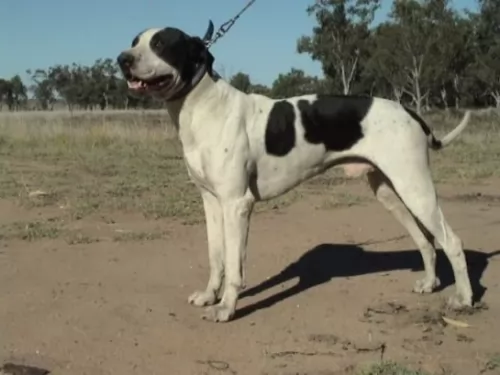 Alangu Mastiff is a very powerful breed. They are a giant breed that is very strong and protective. If you are first time owner, you definitely don’t want this breed as your first pet. They can be very aggressive, and if you are not a dominant owner who knows what he is doing all the time, you can have a lot of troubles with this breed. Alangu Mastiff is a guard dog, and they tend to protect the family no matter what is happening. Of course, with proper care and socialization, they can be wonderful pets that love family, and they can be gentle with children too. Basically, it is very important to socialize them from the earliest age. Alangu is also very hard to train, so you have to be patient and devote a lot of time to train your dog properly. Since they are large dogs, they require a lot of exercises. Walking with the leash is not enough for this breed. They need to run to be fully happy. They can be very aggressive towards other dogs, so it is not very recommendable to spend time with other pets, at least not if they are not socialized. If you train them from an early age, then you should still be careful how your dog behaves around other pets and animals. Don’t get this wrong, Alangu can be a wonderful pet for the whole family, but you have to be careful and well-trained for this breed. They require a lot of attention, patience and time, but overall they can be amazing pets.
Alangu Mastiff is a very powerful breed. They are a giant breed that is very strong and protective. If you are first time owner, you definitely don’t want this breed as your first pet. They can be very aggressive, and if you are not a dominant owner who knows what he is doing all the time, you can have a lot of troubles with this breed. Alangu Mastiff is a guard dog, and they tend to protect the family no matter what is happening. Of course, with proper care and socialization, they can be wonderful pets that love family, and they can be gentle with children too. Basically, it is very important to socialize them from the earliest age. Alangu is also very hard to train, so you have to be patient and devote a lot of time to train your dog properly. Since they are large dogs, they require a lot of exercises. Walking with the leash is not enough for this breed. They need to run to be fully happy. They can be very aggressive towards other dogs, so it is not very recommendable to spend time with other pets, at least not if they are not socialized. If you train them from an early age, then you should still be careful how your dog behaves around other pets and animals. Don’t get this wrong, Alangu can be a wonderful pet for the whole family, but you have to be careful and well-trained for this breed. They require a lot of attention, patience and time, but overall they can be amazing pets.
 This is a working dog, intelligent and independent guard dog. Reserved around strangers but loyal and devoted with his family. Tolerant of children in their family if they were raised with them. Not only will she defend human family members, she will guard and defend household pets as well. He is quite capable of making her own independent decisions. These are very intense guard dogs that will respond aggressively if they think their people are being attacked.
This is a working dog, intelligent and independent guard dog. Reserved around strangers but loyal and devoted with his family. Tolerant of children in their family if they were raised with them. Not only will she defend human family members, she will guard and defend household pets as well. He is quite capable of making her own independent decisions. These are very intense guard dogs that will respond aggressively if they think their people are being attacked.
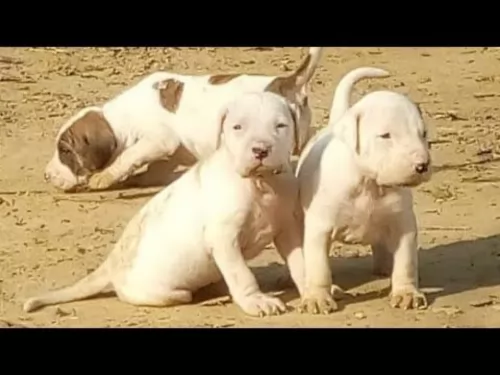 Basically most of the health problems depend on the dog to dog. If you choose puppy carefully, with an adequate examination of professional you will have a healthy dog. Alangu Mastiff is overall healthy breed, but as every other breed, they can develop some issues. Hip dysplasia is can be common for this breed, but again, only if you don’t select your puppy carefully.
Basically most of the health problems depend on the dog to dog. If you choose puppy carefully, with an adequate examination of professional you will have a healthy dog. Alangu Mastiff is overall healthy breed, but as every other breed, they can develop some issues. Hip dysplasia is can be common for this breed, but again, only if you don’t select your puppy carefully.
 The breed itself is known to be healthy but they do face some of the usual health issues of the massive, giant breeds. This includes knee and elbow dislocation; hip dysplasia; bloat; entropion and osteosarcoma. All of these conditions require medical intervention, but bloat and osteosarcoma are the deadliest. Bloat needs immediate attention and osteosarcoma is a deadly bone cancer.
The breed itself is known to be healthy but they do face some of the usual health issues of the massive, giant breeds. This includes knee and elbow dislocation; hip dysplasia; bloat; entropion and osteosarcoma. All of these conditions require medical intervention, but bloat and osteosarcoma are the deadliest. Bloat needs immediate attention and osteosarcoma is a deadly bone cancer.
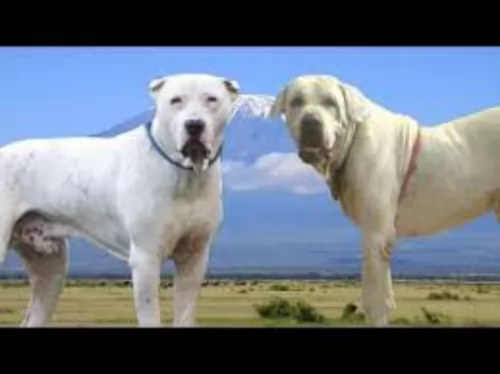 Feeding of your dog highly depends on activity, size, and food that you are feeding your dog. 5-10 cups of high-quality food divided into 2 meals would be enough for an average Alangu Mastiff, but again, you should feed your dog based on activity.
Feeding of your dog highly depends on activity, size, and food that you are feeding your dog. 5-10 cups of high-quality food divided into 2 meals would be enough for an average Alangu Mastiff, but again, you should feed your dog based on activity.
Puppies must eat 3-5 times per day, few cups of high-quality food. They need to eat quality food with a lot of vitamins and minerals to develop into a happy and healthy adult.
Groming is one of the easiest jobs that you should do around your Alangu Mastiff. They are very easy to take care off. Few brushes every now and then would be enough to have perfectly groomed pet. They do not have long coats with a lot of fur so there will be no hair around the house, and maintaining this majestic creature is very easy.
 These are large dogs with large appetites, but you want to keep them lean and active. Feed them at least twice a day with a high quality large or giant dog dry food. Four to five cups of food per day is the maximum.
These are large dogs with large appetites, but you want to keep them lean and active. Feed them at least twice a day with a high quality large or giant dog dry food. Four to five cups of food per day is the maximum.
Patellar Luxation – a floating kneecap or dislocated knee. Will cause lameness.
Osteosarcoma – bone cancer must be treated immediately as it is potentially fatal.
The Bulgarian Shepherd needs a good amount of exercise every day. Remember this is a working breed and they need a job. Long walks every day are essential for his well-being.